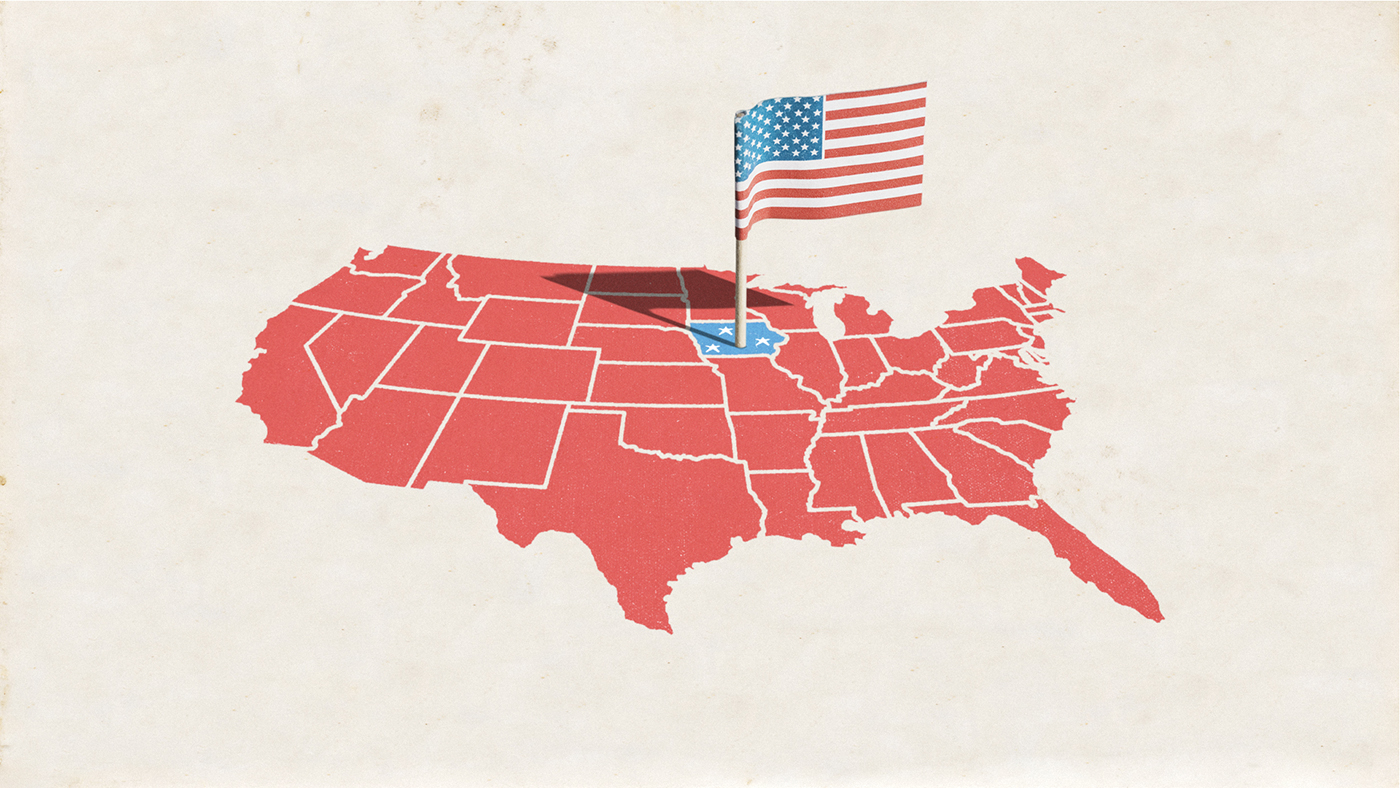Why Iowa is so important in the 2024 US presidential election
Donald Trump and other Republican candidates headed to the Iowa State Fair to kick off campaigns

A free daily email with the biggest news stories of the day – and the best features from TheWeek.com
You are now subscribed
Your newsletter sign-up was successful
Leading hopefuls for the Republican presidential nomination including Donald Trump, his former vice-president Mike Pence and Florida Governor Ron DeSantis kicked off their bids to win over voters in Iowa at the state fair last weekend.
The Midwestern state may be “small”, its population “overwhelmingly white” and its turnout for the caucuses “absurdly low”, wrote Andrew Prokop at Vox, but Iowa has become “super important” in deciding who is nominated by both Republicans and Democrats in the race for the White House.
The caucuses are not until January, but the summer Iowa State Fair is a “rite of passage for presidential candidates”, said John McCormick at The Wall Street Journal. It can be a “humbling place” for the “lesser-known candidates”, but the “massive media coverage” surrounding the annual event offers an invaluable “boost for candidate exposure”.
The Week
Escape your echo chamber. Get the facts behind the news, plus analysis from multiple perspectives.

Sign up for The Week's Free Newsletters
From our morning news briefing to a weekly Good News Newsletter, get the best of The Week delivered directly to your inbox.
From our morning news briefing to a weekly Good News Newsletter, get the best of The Week delivered directly to your inbox.
Why does Iowa matter so much?
It’s because Iowa is the first state where “actual voters across any US state get up and go say who they want to be president”, said Vox’s Prokop. The 2024 caucuses will be the first time since 1972, however, that only the GOP will begin its election process in Iowa, with the Democratic Party opting to start its presidential primary in South Carolina, in a bid to “empower minority voters”, said Brynn Holland at History.
After the primary elections were reformed for the 1972 presidential election to ensure “voters would have a direct say” in choosing the nominees, and given Iowa’s long nominating process, the state was given an “early slot on the voting calendar”.
That early slot means the media “hypes up” the results, wrote Prokop, but it is also the first chance for voters in other areas to “make sense of complex, multi-candidate fields”, while donors also weigh up whether a candidate is “still viable” after their performance in Iowa.
A strong result in Iowa can hand a candidate “momentum that can propel their campaigns forward”, wrote The Economist.
A free daily email with the biggest news stories of the day – and the best features from TheWeek.com
How much influence does Iowa really have?
While the Iowa caucuses may provide an early shot in the arm to a candidate’s campaign, they do not necessarily “translate to winning the general election”, said Candice Norwood at PBS.
There is also a difference in “the success of Republican and Democratic winners” in gaining their party’s nomination after winning in Iowa. Democrat winners in Iowa routinely gain the presidential nomination when compared to the Republicans. That is because the Republican votes tend to be “referendums on who is the most socially conservative candidate”, which is not “necessarily a reflection of the broader Republican coalition”, Matthew Dallek, a political historian at George Washington University, told PBS.
Winning in Iowa can have a big effect on the national picture, however, said Harry Enten at CNN. On average, victorious candidates receive “a seven-point bounce in the national polls”.
What role does the Iowa State Fair play?
The Iowa State Fair is one of the “biggest political events” leading up to the caucuses and “unofficially kicks off the campaign season”, said Dylan Wells at The Washington Post.
While candidates will never give up a chance to augment their standing in the polls, the fair “offers an opportunity to meet directly with the Iowans” for the first time.
Most candidates who attend will make a “brief speech” but often face “hecklers and tough questions shouted from passing attendees”. They’ll also try to find “common ground with working-class people” by taking part in some of the fair’s activities, while also trying to “avoid awkward photos of themselves eating”.
Though the “good politicking” at the fair, which runs from 10-20 August, won’t necessarily decide the next president, it can “refresh a struggling campaign or lift political underdogs into the national spotlight”.
Who succeeded at this year’s fair?
Former president Trump showed he would “not concede even a moment of the spotlight” to his rivals after appearing in Iowa last weekend, said Lisa Lerer in The New York Times. He was given “a much warmer reception” than his main challenger, DeSantis, despite being on “rocky terms with leaders in Iowa”.
DeSantis has “struggled to connect with voters in more unscripted moments” and was booed at the fair by the Trump supporters he “hopes to win over”.
Richard Windsor is a freelance writer for The Week Digital. He began his journalism career writing about politics and sport while studying at the University of Southampton. He then worked across various football publications before specialising in cycling for almost nine years, covering major races including the Tour de France and interviewing some of the sport’s top riders. He led Cycling Weekly’s digital platforms as editor for seven of those years, helping to transform the publication into the UK’s largest cycling website. He now works as a freelance writer, editor and consultant.